I’m relieved it’s January. I love the spirit of holiday season, but I’m thrilled to leave the holiday pressures of gifts and travel behind. Though there’s a lot of winter ahead, we are inching our way into longer days. I felt wistful as December closed, but January brings fresh hope.
I enjoyed Christmas cookies for breakfast, but January is a time to clear out the excess of the holidays. That doesn’t have to mean boring food. Just as there are good cookies and bad cookies, healthy food can be tasteless and dull or it can be fresh and flavorful.
I think tea eggs are just the thing for a busy new year. More interesting than a regular hard-boiled egg, simpler than a deviled egg, tea eggs have a little salt, a little soy, a hint of tea and a beautifully marbled look.
Enjoyed by Chinese for centuries, tea eggs are great hot or cold, savored on a plate or eaten on the run. They make a satisfying portable breakfast or wholesome snack for cleansing month. They also make fantastic airplane food.
Fast food restaurants are regrettably ubiquitous in Asia today, but tea eggs are old-school Chinese fast food. Convenience stores in China and Taiwan still stock a warm potful by the register for busy people to grab a snack on the go.
A hard-boiled egg is already one of nature’s perfect foods – portable, nutritious, satisfying. But alone it can be kind of bland. Infused with the flavors of salty soy sauce and fragrant tea, Chinese tea eggs achieve a rare combination of health, flavor and convenience. And they are so easy to make.
I’m glad to see that eggs have been vindicated by the often-confusing health authorities in recent years. Even though eggs contain a high level of cholesterol, according to a Harvard report, “For most people, only a small amount of the cholesterol in food passes into the blood. Saturated and trans fats have much bigger effects on blood cholesterol levels.”
Tea eggs are traditionally eaten during Chinese New Year, which falls this year on January 25. With holiday distractions, I’m long delayed getting a new post out, but rather than feeling late – my perpetual state, alas – I’m going to see myself as early for Chinese New Year. A new year deserves a clean start.
My mom makes tea eggs without a recipe, but for us she found one in a vintage cookbook, the amusingly titled Madame Wong’s Long-Life Chinese Cookbook. According to Madame Wong, tea eggs “symbolize wealth, prosperity and fertility.” And they taste good too.
How’s this for a ’70s book design?
Madame Wong uses dark soy sauce, which I don’t own and is uncommon outside of Asian food markets. Easier to find is Kikkoman, a Japanese soy sauce which is traditionally fermented, without the chemicals and additives often found in Chinese soy sauces. Chinese soy sauces come in light and dark varieties, dark being thicker and less salty than light. Kikkoman describes its product as somewhere in between.
My mom uses Kikkoman soy sauce to add saltiness and flavor to her tea eggs, and when I did the math, the amount matches very closely to the sodium in the dark soy and salt combination used by Madame Wong.
Start by hard boiling some eggs. I like to make a dozen, because they keep for a week and are so deliciously convenient.
Use your fingers or the back of a spoon to crack the eggshells. The flavor seeps in through the cracks, so better to have a messily cracked shell than one that is not cracked enough.
A well-cracked egg.
Cracked eggs go gently back in the pot.
Add black tea, loose leaf or tea bags. I’ve read that pu-erh tea is traditional, but you can use oolong, Lipton, or whatever you have. My mom uses any tea she’s looking to get rid of – the tea flavor is dominated by the soy sauce, so the type is not critical.
Add soy sauce and a star anise (unfortunately hidden in the picture among the tea leaves). The star anise adds a slight licorice note to the mix, but you can leave it out entirely or flavor the eggs instead with five-spice powder, a bit of sugar, dried orange peel, cinnamon stick or Sichuan peppercorns.
My mom likes to have the eggs in one layer, so we took a couple out. We also could have used a wider pot.
Add water. If you add enough to cover the eggs, you don’t have to turn them. My mom prefers to keep the liquid more concentrated and turns the eggs once halfway through cooking.
This is what you get after simmering for an hour.
The eggs will continue to absorb flavor as they soak. Frugal chinese grandmas can store the liquid for future batches.
We used a bit of dark soy sauce in this batch for experimentation. With Kikkoman soy sauce you don’t get big dark patches. What we like is nicely marbled eggs.
With long-cooked eggs, it’s common to have a slight grey/green ring around the yolk. If you are super-picky, you can heat the soy/tea liquid separately and steep the eggs in it instead of simmering the cracked eggs in the liquid. It will take longer for the flavor to absorb, but you will maintain uniformly yellow yolks.
Happy New Year, everyone! I’m so grateful to have you here and wish you all best for a happy, healthy 2012.
Tea Eggs
This is Chinese fast food – deliciously savory hard-boiled eggs, ready to eat warm or cold. Soy sauce adds salt and flavor; black tea adds color and a subtly fragrant note. They make an easy, satisfying breakfast or convenient wholesome snack.
Ingredients
- 6 eggs
- 2 tablespoons (2 bags) black tea
- 1/4 cup soy sauce
- 1 whole star anise
- Water
Directions
- Place eggs gently in a large pot and add water to cover. Bring to boil. Depending on your preference, either 1) remove from heat, cover and let sit 20 minutes or 2) turn to low and simmer for 10 minutes. Drain eggs and let cool (you can speed cooling by giving the eggs a cold water bath, draining and refilling when the water gets warm again).
- Using your fingers or the back of a spoon, crack each eggshell all around. The cracks allow the flavor to penetrate, so make sure each eggshell is well and deeply cracked all over.
- Place cracked eggs in a pot, ideally keeping in a single layer. Add tea, soy sauce, star anise and water just to cover. Bring to boil. Turn heat to low and simmer for an hour, turning eggs if water gets low. Leave eggs in liquid, as eggs will continue to absorb flavor. Refrigerate when cool.
Notes
- If you don’t have star anise, leave it out or try one of these optional flavorings: dried orange peel, five spice powder, sugar, cinnamon stick, sichuan peppercorns.
- Frugal chinese grandmas can save the liquid for another batch. Store in refrigerator if using within a few days; otherwise freeze for a later date.
- Cooking hard boiled eggs for a long time can result in a gray-green outer layer on the yolk that will not affect the taste. If the aesthetics really bother you, try these modifications: 1) cool hard-boiled eggs in ice-watera bath immediately after cooking, 2) bring water, tea and soy sauce to a boil first, then pour over well-cracked eggs, 3) let eggs soak in liquid in refrigerator overnight or longer. The flavor may not be as strong as in eggs simmered in the tea/soy sauce liquid, but your yolks should stay bright yellow.
Here’s the link to a printable version.

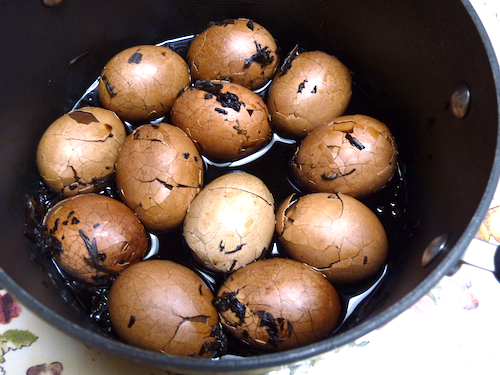
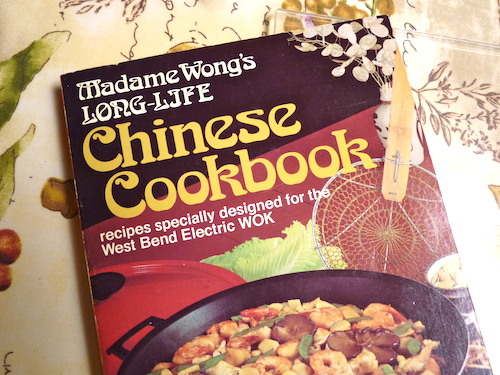
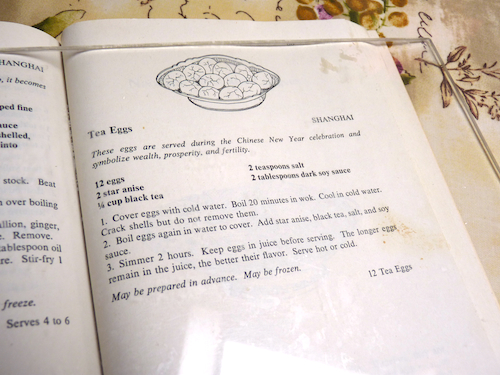
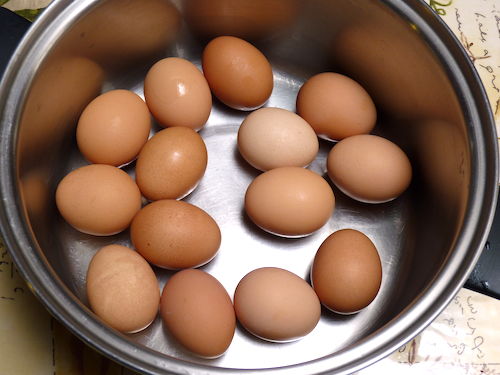
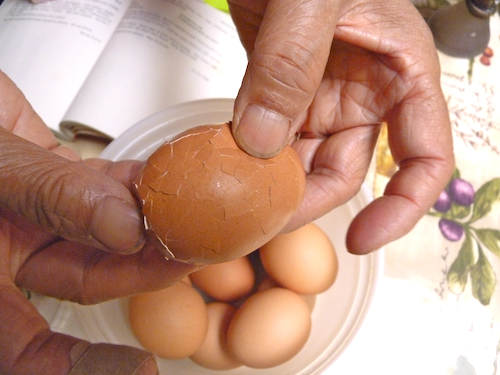
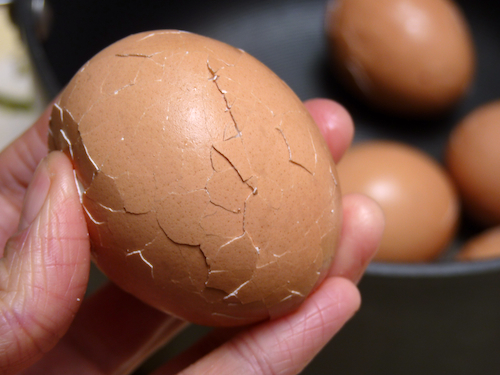
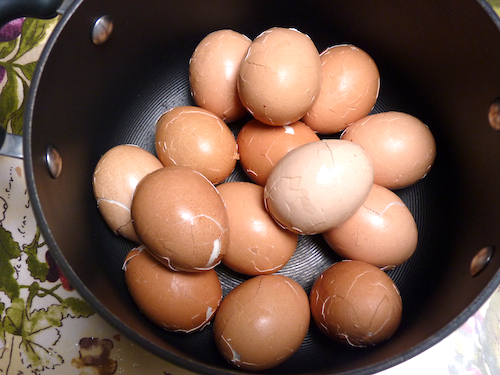
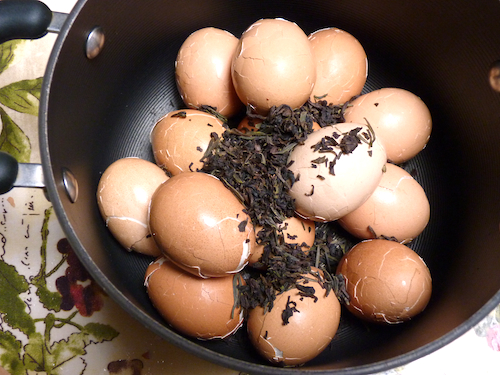
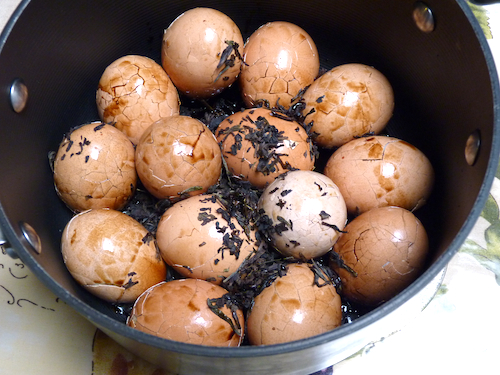
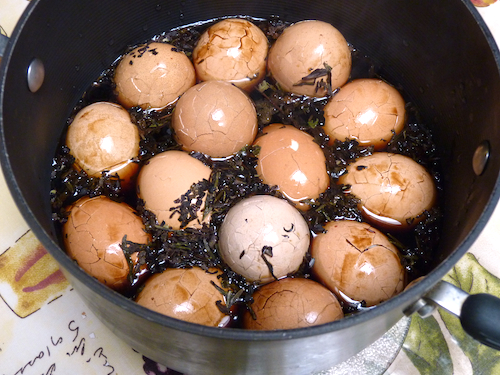
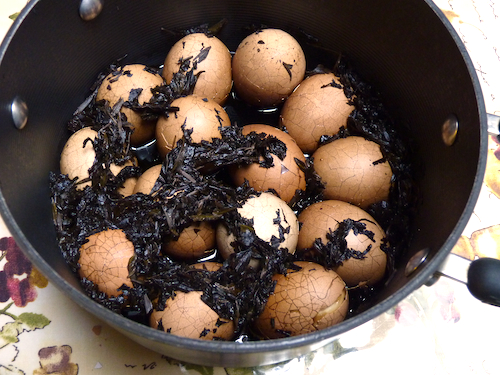
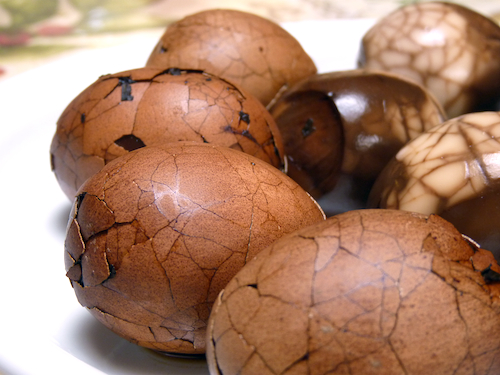
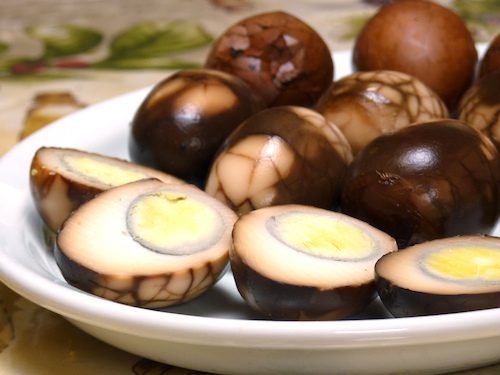




Thanks for this unique recipe, I’m really excited about trying it! What a nice adaptation to the traditional, somewhat boring plain hard-boiled egg! I’m curious if you have ever tried the substitutes of orange peel, cinnamon stick, etc., in place of the anise? Your thoughts?
hi mary-margaret – i haven’t tried any substitutes myself, but i have had different flavored tea eggs, and i like them all. really the primary taste is soy sauce – even a strong tea takes a backseat to the saltiness. so the additional flavor note is really optional – my mom often makes the eggs with just tea and soy. but if any of the other flavors appeal to you – or if you just want some variation from the basic – i think they would all be very good. let me know if you try any!
reading your note on eggs and cholesterol, University of Connecticut and published in http://news.menshealth.com/the-best-breakfast-for-men/2012/04/26/
Eggs actually boost the good cholesterol, just a note to let you know that the past few years they have changed their mind on eggs, hmmm interesting, they’re great, i can’t wait to try your recipe for my husband, i’m sure we’ll love them.
thanks jewels – i agree with you completely on poor maligned eggs. glad to see people are coming to their senses. thanks for the link!
Thanks so much for this, I really miss tea eggs after living in China and I just had a craving… Off to make a batch now 🙂
I just want to say thanks for your recipe! I have been making this at least 10 times in the past because tea eggs make boiled egg taste so much better. Thank you 🙂
hi fironica – i agree, tea eggs are so much better! thanks for taking the time to let me know you are enjoying them. =)
My husband and I were just talking about this recipe~Vons/Safeway has a great sale on 60 eggs $7!! I will make some today, simmering the ingredients first to let the eggs set since we like the yolks more yellow, and I think i’ll add a little sichwan peppercorn with some orange water and anise too but in a cloth to keep the liquid clear of pieces. I’m wondering if you’ve ever used Kechup (i make homemade) as your dark soy? I’ll keep them in the liquid refrigerated easy access, should I more add salt to the water & submerge? Thanks for inspiring~I smile at Madam Wong’s book you picture. I also have had it since the 70’s on my bookshelf and I met her in the 1980’s at an Epicurian event. A very inspiring, successful & beautiful woman indeeed, I’m still in Awe! I also love Kylie Kwong’s easy recipes have you tried any?
Oh my, I’ve been looking for a good tea egg recipe for ages! It was one of my favourite street foods growing up. Having lived in Hong Kong, it absolutely made my day when my mom bought me a tea egg or those egg waffles as a treat!
hi genevieve – my mom just made a fresh batch today! love them every time. =)
Hi made my first batch today….steeping in the fridge as i didnt want to over cook the eggs. …next batch will be different..lol
But what is the purpose of the tea???
hi john – tea really does add flavor, subtler than the soy sauce but essential. i hope you like them!
I just made my first batch (after finally replacing my old nasty wok with a nice carbon steel one I’ve been inspired to recreate some of my old favourites from my travels in China) and came running back to the internet because I thought my cracks were too big. Judging by the photos they should be okay. I used light and dark soy, tea, orange zest, cinnamon, and star anise. Smells good. Though I didn’t think to use sichuan peppercorns, and I love that flavour, so I might swap that in for the anise next time.
hi jeremy – that sounds so good…thanks so much for sharing back!
Recently I stayed at a motel just outside of Rosemead, CA…breakfast came with the stay…I had never heard of or tasted tea eggs…they were incredible. I tried to get the recipe, but no one spoke enough English to understand what I was asking for. This recipe sounds just like what I had for breakfast!! Jazzed to try them.
hi carol – how cool that the motel had tea eggs at breakfast! they are so easy to make, and such excellent portable, ready-to-eat nutrition. good luck, hope they live up to your expectations!
My Chinese daughter-in law’s father who speaks no English was visiting when I was at my son’s home. He fixed me several Chinese Tea Eggs for my trip home. I had no idea what they were. Were they some sort of egg other than chicken such as duck? I asked my son and he found out that the eggs prepared by his father in law were cooked in tea and other condiments. Not sure how to do this, I “googled” Chinese tea eggs and now I am fixing them for a short air flight I will be taking.
Do you keep these in the liquid when storing in the fridge??
hi stacie – no you can remove them from the liquid and store them unpeeled in a container. thx for asking!
My son always talk about the tea-eggs his Chinese teacher makes for the students. I can’t even get him to eat eggs! Thank you for this recipe, it satisfied his cravings for tea eggs during the summer break. I’ll be making this many times over.
hi sylvia – this is so great! always an unexpected plus when kids latch onto food that is actually good for them too. =) hope you’ve had a wonderful summer!
My husband and I took cooking lessons from the dynamic, feisty Madame Wong in the late 70’s. This was one of my favorite recipes, which I copied from her book-but have misplaced. What a delight to do a google search for tea eggs and find her recipe! Hope you try some of the other recipes from her book.
If I wish to substitute the star anise for five spice powder,how much would I add for 12 eggs.I have doubled the 6 egg recipe but don”t know how much five spice powder to add instead of star anise .
Thanks
Loraie
hi loraie – i’ve never tried it, but i read that 1/2 teaspoon five spice powder works for 1 star anise. so maybe try 1 teaspoon for your double recipe? good luck!
Anyone run into the problem of having their eggs/mixture go bitter? It’s not a totally unpleasant flavor, kind of elevates the herbaceous quality of the tea portion of the mix, and it doesn’t lead to stomach upset. I used a young pu ehr that I didn’t like drinking.
hi mei – sorry you had this problem. perhaps the tea developed a bitter taste with the boiling? this recipe doesn’t cook for too long, so i’ve never had that issue before. i hope you will try it again with another tea. thanks for taking the time to let me know.